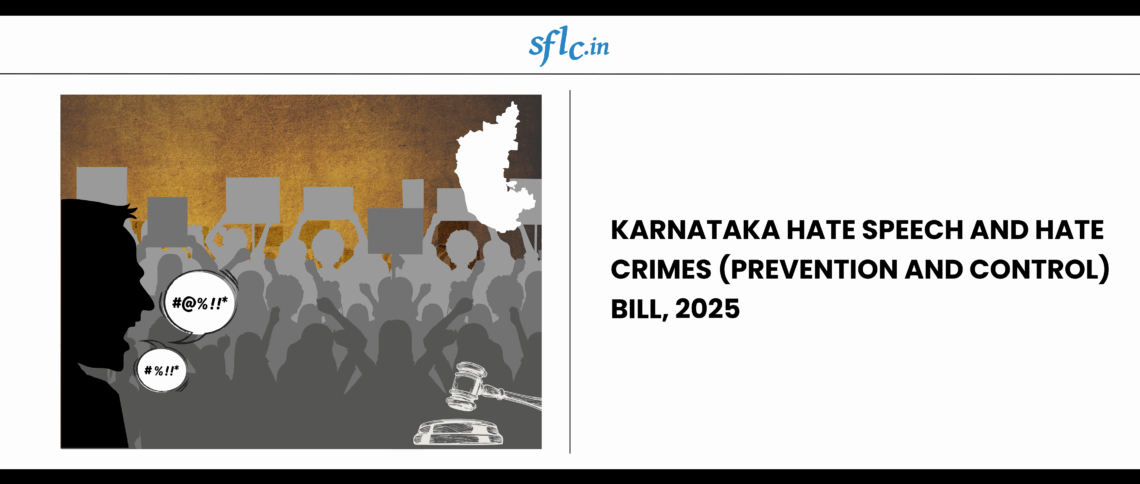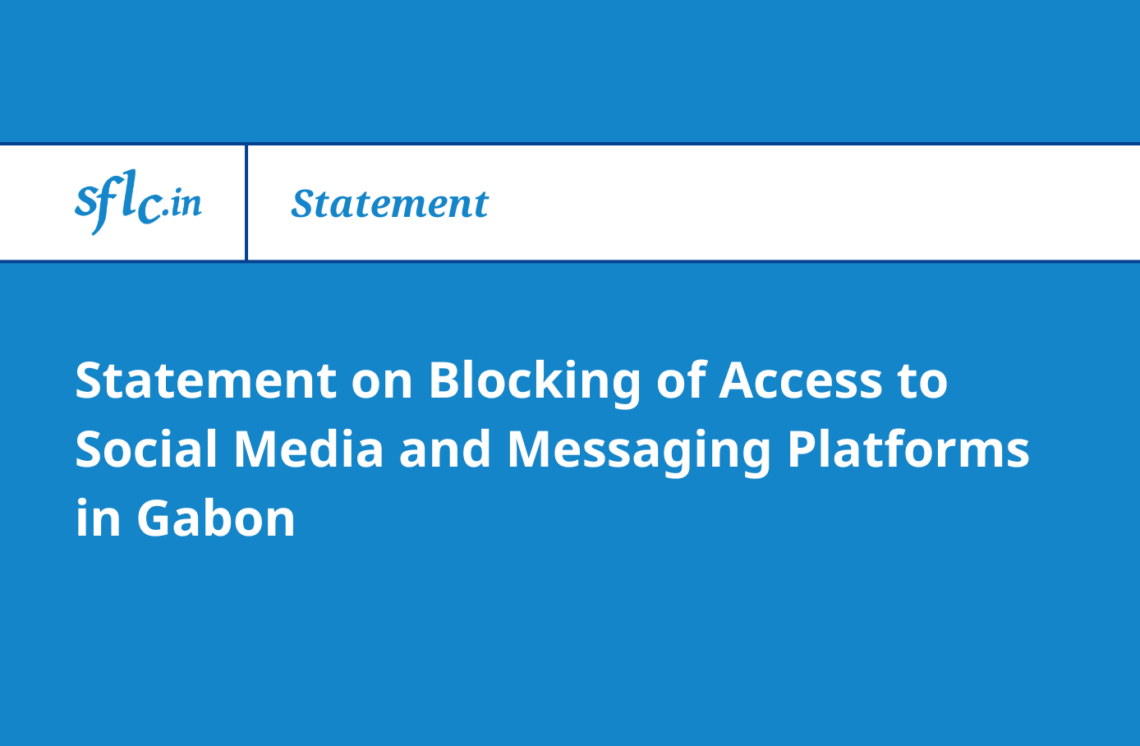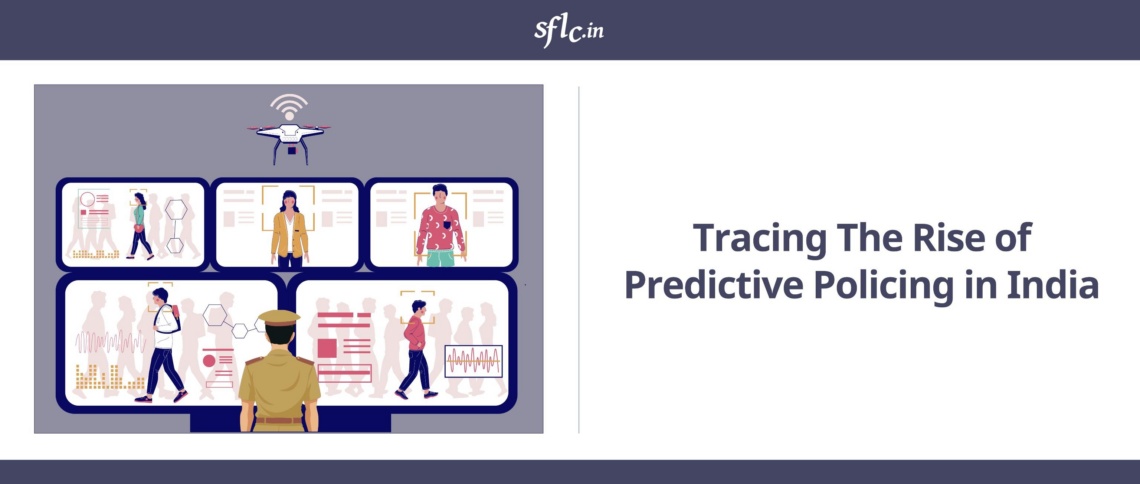The Karnataka State Government has released the Karnataka Hate Speech and Hate Crimes (Prevention and Control) Bill, 2025 (Hate Speech Bill), a legislation aimed at preventing the propagation of hate crimes and hate speech. The Bill is modelled along the lines of the Hate Speech and Hate Crimes (Prevention) Bill, 2022, introduced in the Rajya Sabha.
The Hate Speech Bill has been introduced in light of increasing communal tensions in Karnataka, and proposes punishments of imprisonment up to 3 years and a fine of 5000 rupees or both. The crime of hate speech will be both non-cognisable and non-bailable.
The Hate Speech Bill defines the offence of hate speech under Clause 5, as any communication, both online and offline, that could reasonably be construed to demonstrate a clear intention to harm or incite harm or promote or propagate hatred on the basis of religion, race, caste or community, sex, gender, sexual orientation, place of birth, residence, language, disability, or tribe. Communication includes distribution of material, electronic communication, or the display of material that could be defined as hate speech.
The Hate Speech Bill also carves out some exceptions, for bona fide artistic creativity, performance or other form of expression, academic or scientific inquiry, and the bona fide interpretation and proselytisation or espousing of any religious tenets.
Further, under Clause 7, aiding, abetting or assisting the commission of hate speech would also be punishable with imprisonment up to 3 years and a fine. The Clause sets out a broad mandate, and any person ‘knowingly or unknowingly’ assisting in the commission of hate speech would be made liable. Sub-Clause 7(2) goes a step further, and also mentions that intermediaries who provide their platform to commit such offence, shall be punished with imprisonment up to three years, and shall also be liable to fine or both.
Under Sub-Clause 7(3) supplying money in support of an act which could constitute hate speech would be punished with imprisonment up to three years, and shall also be liable to fine or both.
Section 66A Revamped
At the outset, while it is indeed true that hate crimes and hate speech are rapidly proliferating in India, the approach taken by the present Bill has the unintended effect of creating a chilling effect on free speech. Reference can be made to the judgment laid down in Shreya Singhal vs Union of India[1], where the Supreme Court struck down Section 66A of the Information Technology Act, 2000. Section 66A criminalized the sending of offensive messages through electronic means, and stated that sending information that was ‘grossly offensive; false and meant for the purpose of causing annoyance, inconvenience, danger, obstruction, insult, injury, criminal intimidation, enmity, hatred or ill will’ would be punishable. The SC held that the Section was a violation of the right to freedom of speech and expression guaranteed under Article 19 (1) as Section 66A was unconstitutionally vague and its intended protection extended beyond the scope of the reasonable restrictions to free speech under Article 19(2) of the Constitution of India. This could result in “a very large amount of protected and innocent speech” being curtailed.
The Karnataka Bill suffers from the same constitutional vice of vagueness that led to Section 66A being struck down. Section 3 of the Bill criminalizes speech that “harms or incites harm or promotes or propagates hatred” without defining these crucial terms. Similarly, Section 5 prohibits communication that could “reasonably be construed to demonstrate a clear intention to harm or incite harm or promote or propagate hatred”.
The Supreme Court in paragraph 76 of Shreya Singhal held that “every expression used is nebulous in meaning. What may be offensive to one may not be offensive to another. What may cause annoyance or inconvenience to one may not cause annoyance or inconvenience to another… There is no demarcating line conveyed by any of these expressions – and that is what renders the Section unconstitutionally vague”.
The Karnataka Bill’s use of terms like “harm” (defined broadly to include “emotional, psychological, physical, social or economic harm”) and “hatred” (left entirely undefined) creates the same constitutional infirmity. As the Court noted in paragraph 82, “If judicially trained minds can come to diametrically opposite conclusions on the same set of facts, it is obvious that expressions such as ‘grossly offensive’ or ‘menacing’ are so vague that there is no manageable standard”.
The Court in paragraph 83 held that “Information that may be grossly offensive or which causes annoyance or inconvenience are undefined terms which take into the net a very large amount of protected and innocent speech”. The Karnataka Bill’s broad definition extends this net even wider by including subjective concepts like “emotional harm” and communications that might merely “promote hatred” without requiring imminent lawless action.
The vague and overbroad provisions of the Karnataka Bill could create a substantial chilling effect on free speech. The Supreme Court in paragraph 5 noted that “the said Section has a chilling effect on the freedom of speech and expression”. The Court further observed in paragraph 90 that vague laws are “liable therefore to be used in such a way as to have a chilling effect on free speech”.
The Karnataka Bill’s subjective standards and broad scope would compel speakers to self-censor, fearing prosecution for legitimate expression. The inclusion of “emotional harm” as a basis for prosecution particularly exacerbates this chilling effect, as virtually any controversial opinion could potentially cause emotional distress to some individuals.
Article 19(2) permits restrictions on free speech only on eight specific grounds: sovereignty and integrity of India, security of the State, friendly relations with foreign States, public order, decency or morality, contempt of court, defamation, or incitement to an offence. The Karnataka government appears to justify the Bill primarily under the grounds of “public order” and “incitement to an offence.”
However, the Supreme Court has established stringent requirements for invoking these grounds. In Ram Manohar Lohiya v. State of Bihar, the Court distinguished between law and order, public order, and security of the State, holding that restrictions must have a direct and proximate connection to public order, not a “remote or fanciful connection”.
The Karnataka Bill fails the reasonableness test established in constitutional jurisprudence. The Supreme Court in Chintaman Rao v. State of Madhya Pradesh held that reasonable restrictions connote that “the limitation imposed on a person in enjoyment of the right should not be arbitrary or of an excessive nature, beyond what is required in the interests of the public”.
The Bill’s broad criminalization of speech causing “emotional harm” or “promoting hatred” without requiring imminent lawless action exceeds what is necessary for maintaining public order. The three-year imprisonment and making the offences non-bailable under Sections 4 and 6 appear disproportionate to the nature of the speech offences.
In summation, the Hate Speech Bill exhibits striking similarities to Section 66A, which was struck down in Shreya Singhal. Both provisions:
Firstly, criminalize vague categories of speech, Section 66A prohibited “grossly offensive” or “annoying” messages, while the Karnataka Bill prohibits speech causing “harm” or “promoting hatred”. Secondly, a lack of definitional clarity; neither provision adequately defines its key terms, creating uncertainty about what conduct is prohibited. Thirdly, capture protected speech. Both provisions encompass legitimate discussion and advocacy within their scope. Fourthly, create chilling effects, the vague language compels self-censorship of protected expression, and lastly, fail proximity requirements. Neither establishes the necessary connection between speech and immediate harm to public order
Section 5(2) of the Karnataka Bill provides limited exceptions for “bona fide artistic creativity,” “academic or scientific inquiry,” and “fair and accurate reporting”. However, these exceptions are insufficient to cure the Bill’s constitutional defects. The Supreme Court in Shreya Singhal paragraph 90 held that overbroad laws cannot be saved by narrow exceptions, as they still create a chilling effect on protected speech.
Moreover, the exceptions themselves contain vague qualifiers like “bona fide” and require that the expression “does not advocate hatred that constitutes incitement to cause harm,” which reintroduces the same definitional problems plaguing the main provisions.
The issue with the current Bill too is that the sweep of the legislation is overly broad, and results in the violation of the right to free speech and expression. While well-intentioned, the Bill excessively invades free speech, and criminalizes communication in a vague and arbitrary manner.
Intermediary Liability
Clause 7(2) is particularly problematic as well, as criminalizing intermediaries for content posted on their platforms, particularly ‘unknowingly’ would be a violation of safe harbour provisions. On the issue of intermediary liability, the Court in Shreya Singhal held that the ‘actual knowledge’ requirement for an intermediary to take down content has to be read to mean either an intimation in the form of a court order or on being notified by the government. If platforms are criminalized for actions that take place without their knowledge, despite due-diligence undertaken by them, they are liable to engage in over-censorship and curtail free speech further.
This provision is also a sign of increasing reliance on personal liability being imposed on intermediaries, which is turning into a global trend. Such provisions can subject individual employees to personal, criminal liability which constitutes an overreliance on stringent statutory mechanisms for third/private party compliance on government action. Eventually, such practices erode public trust in the online ecosystem.
The provision to penalize platforms for content that has been posted ‘unknowingly’ would strongly encourage over-censorship by platforms. It would force them to action even acceptable instances of free speech in order to ensure that they remain compliant with the law, something that would have negative impacts on the online ecosystem as a whole. Platforms would either have to invest in geo-blocking of content merely in Karnataka, or ensure that all content in India was subjected to Karnataka’s standards under the Hate Speech Bill.
As governments worldwide tighten regulations around digital platforms, the tension between enforcing laws and upholding free speech continues to grow. Imposing personal liability on employees for content moderation introduces a troubling dynamic, as intermediaries may resort to over-censorship and over-comply with takedown requests even if they may violate fundamental rights. A path forward is to establish stronger procedural safeguards, transparency mechanisms, boosting media literacy, and providing better tools to factcheck. Digital platforms can implement robust systems to flag and act upon illegal content without overreaching with guidelines for harmful content.
Preventive Measures and Awareness Building
The Hate Speech Bill under Clause 9 provides sweeping powers to the District Magistrate to prohibit any actions which are likely to cause apprehension of breach of peace or creation of discord between members of different groups, castes or communities due to commission of offence under the provisions of this Act. Further, competent authorities under Clause 9(2) have also been given powers to regulate processions and assemblies in their jurisdictions. The powers granted to District Magistrates are particularly broad, and can lead to overcensorship and also the prohibition of free assembly.
While the Hate Speech Bill does have its fair share of issues, a step in the right direction that has been taken is under Clause 10, where the Government has been charged with the duty to promote awareness among the public for the prohibition, prevention and combating of hate crimes and hate speech. Various measures such as education and information campaigns, social context trainings for public officials, and providing assistance and advice to any person who wants to lodge a complaint of a hate crime or hate speech.
Footnotes:
1] AIR 2015 SC 1523




